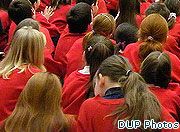Teenagers are being offered a new GCSE-style qualification in sex, which teaches them how to use condoms and obtain the morning-after pill.
The course is a Level 1 qualification, equivalent to a GCSE graded between D and G, and is on offer at nine schools and colleges this term, with plans to expand it across the country.
Critics have warned that the qualification, entitled Level One Award in Sexual Health Awareness, undermines parental authority and encourages sexual promiscuity among youngsters.
Children
The qualification, which makes no mention of marriage, is aimed at children between the ages of 14 and 16 who are not yet ready to take full GCSEs.
As part of the course children are asked to name sexual organs, describe two examples of “risky sexual behaviour” and outline two modes of contraception.
Pupils will also study sexually transmitted infections, and learn about the age at which they can access sexual health services “without parental consent”.
Marriage
But Norman Wells, director of the Family Education Trust, cautioned: “In spite of its name, this new qualification is more about promoting sexual experimentation and the use of contraception by children than it is about promoting sexual health.
“The only sure way of avoiding sexually transmitted infections is to keep sexual intimacy within a faithful lifelong relationship, yet this course makes no mention of marriage or of commitment and faithfulness.
“Instead, the focus is on telling pupils how to use contraceptives and how they can access them behind their parents’ backs. Schools exist to assist and support parents in the education of their children, not to undermine them in this way.”
Infections
Suzanne Cant, research manager at the Northern Council for Further Education, claimed that the qualification could help to tackle teenage pregnancies and soaring rates of sexually transmitted infections.
She said: “Part of the way to tackle these issues is through education and [the] qualification offers a formal way to assess and certificate learners to help ensure the right messages are being delivered and understood.”
A spokesman for the Department for Education said: “There are hundreds of qualifications that are accredited by Ofqual for a plethora of different ages, abilities and settings. We rightly trust heads to choose what is best for their pupils.”
Underage
In July a study by Ofsted, the schools inspectorate, warned that parents were “rarely” consulted about their children’s lessons involving sex education.
The study also found that some schools were failing to help children to ‘say no’ to sex, in their Personal, Social, Health and Economic (PSHE) education lessons.
The study, which looked at 165 schools in England, also covered alcohol awareness education and said children should be taught about the illegality of underage drinking.
However, no such mention of the illegality of having sex under the age of consent was made in the report.

